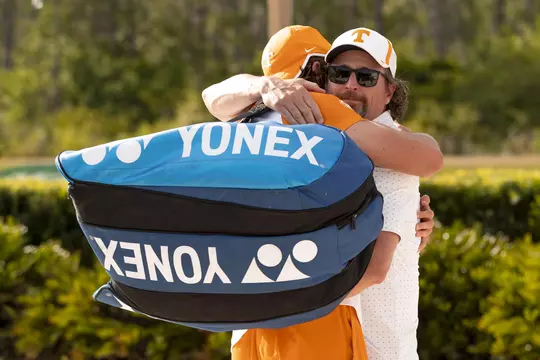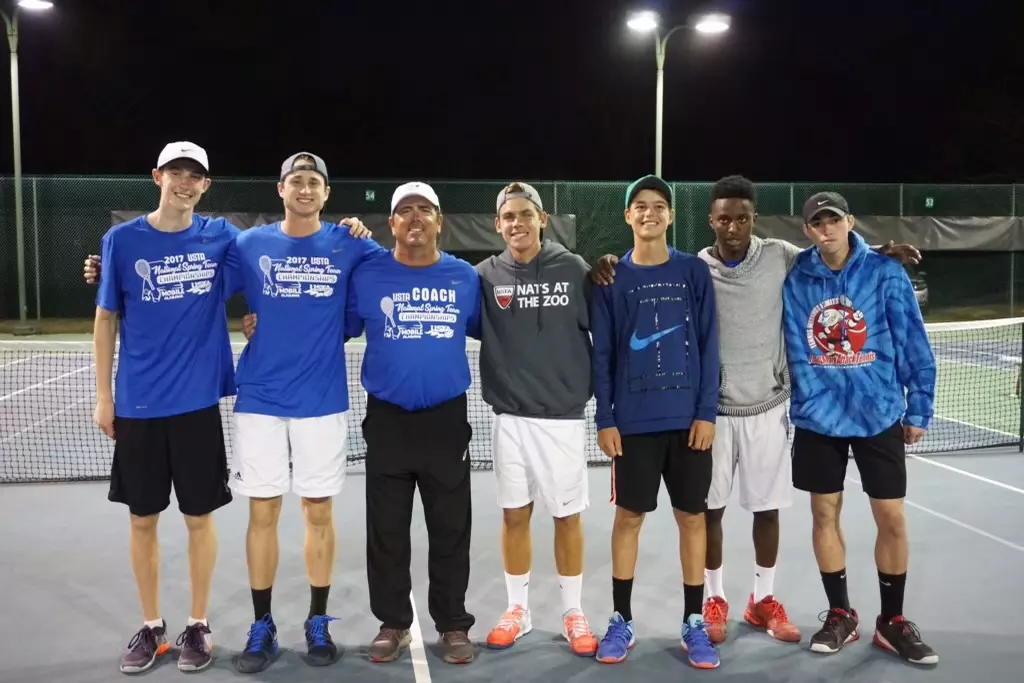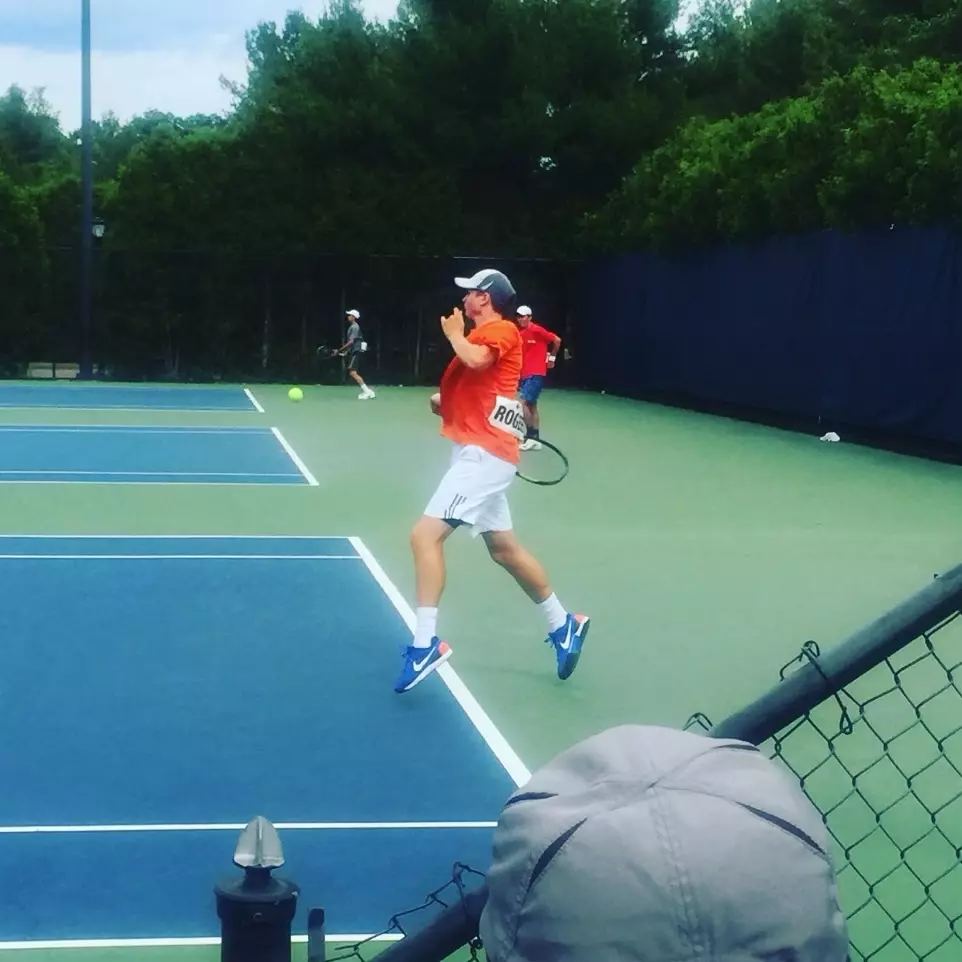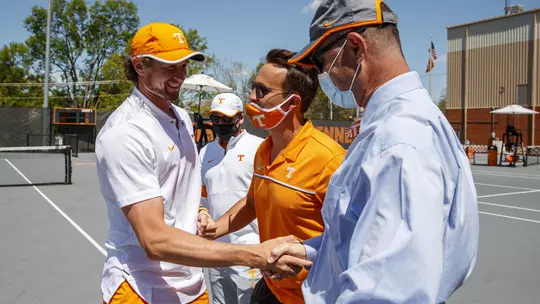
Recovering Perfectionist Rogers' Journey Defined by Growth
Dom Palumbo, UTSports.com
What is growth?
The standard definition says that growth is the act of growing in physical size.
For many, growth elicits the act of growing, or the process of growing.
For Tennessee men’s tennis senior Andrew Rogers, growth has truly defined his four years on Rocky Top.
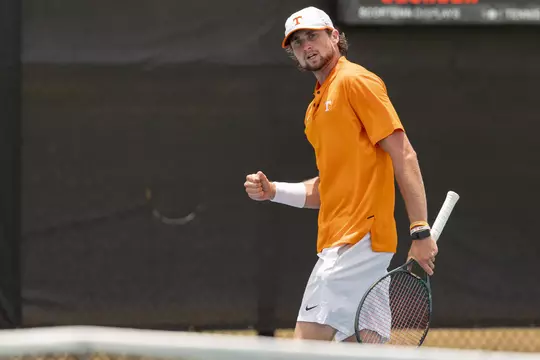
“When I do leave here,” Rogers said. “I want to be remembered as the guy that may not have been perfect, but was willing to change aspects of his life for the betterment of both himself and the team. I hope that can inspire the younger guys to show them that you’re not going to be perfect—and you don’t have to be—but you do have to be resilient, open-hearted and have a desire to change.”
Those are his words as he prepares to depart East Tennessee and embark on a new life adventure.
Where it all began for Rogers was in the suburbs of Nashville, where he grew up with parents who idolized an American tennis icon, in a city with a rich tennis community.
“My dad grew up playing tennis in Iowa, and then my mom started playing when she got to college, and later both of them played club tennis,” Rogers said. “They then started me in it when I was three, because they loved watching tennis on TV. Their favorite guy to watch was Andy Roddick. I don’t remember that much, but I just remember them signing me up, and once I got into it, you couldn’t take the racquet out of my hands. At our house, next to the garage was a brick wall that I would just hit against for hours.”
As his ability developed, one breakout year in particular gave the Brentwood, Tennessee, native all of the confidence in the world to pursue a potential career at the collegiate level.
“I decided I wanted to play college tennis my freshman year of high school, but my breakout year in junior tennis was when I was 15,” Rogers recalled. “There’s this competition called Zonals, and I just happened to somehow make the cut list and barely got in. It works like college tennis, where you have guys ranked 1-6, and I was No. 6. While we were there, I just happened to play some guys that were ranked top-100 to top-200 in the nation and I ended up beating those guys. It was at that point where I thought that tennis was maybe something I could do (at a high level).”
From there, Rogers continued to progress, beginning a bit of an arduous recruiting process.
It was a process that differed from the recruitment of most future collegiate athletes.
“My recruiting process wasn’t very much,” Rogers recalled. “It was a lot of me sending out emails and never getting responses.”
His focus never shifted to Rocky Top, yet out of nowhere, he got a call that would eventually send him on a trajectory toward the life-changing experience he is now about to conclude.
“The Tennessee head coach at the time, Sam Winterbotham, called me up on a Thursday night while I was doing homework and told me he wanted me to take a visit,” Rogers said. “So, I talked to my dad about it, and we (went). The facility was awesome. But aside from that, I just fell in love with the guys.
“I could tell they were very close to one another. Of course, there were different personalities, but everyone was really close, and I could sense that something was changing with Tennessee tennis on my visit. I remember getting in the car with my dad on the way home and said, ‘I think I’m going to go here.’ He said, ‘Ok, let’s just take it easy, take these other visits and get back to it.’ I took one other visit and knew I wanted to go here. I didn’t get any (scholarship) money and was just a walk-on, but there was an opportunity to play if I worked hard.”
Rogers soon made the move to Rocky Top. While no scholarship was on the table, the journey had begun.
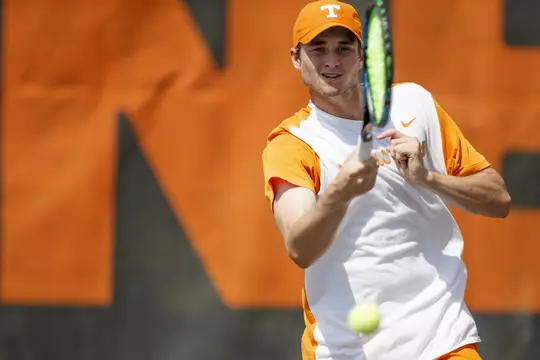
As a freshman, Rogers experienced a leadership transition within the program, as legendary VFL and ATP Tour standout Chris Woodruff was elevated from assistant to head coach.
Shortly after that transition, Rogers saw his growth begin to blossom almost immediately.
“I adapted pretty well to the college life and school and things like that,” Rogers said. “I also knew that I wasn’t quite there, level-wise with the other guys. My consistency in practice just wasn’t as good. I could string three to four practices together where I would be really solid, but the other guys could string two months together of really good practices and matches.
“I recognized that and just had to take what I could get and not throw a fit about it. That’s why during my freshman year, doubles became such a focus, because that was the one spot where I was on an equal level with everyone.”
That year, he became a steady presence at No. 3 doubles, helping lead Tennessee back to the NCAA Tournament following a two-year absence from the sport’s most meaningful tournament.
That summer, Rogers grinded to put himself in position to not just be a part of the team, but to be a key contributor in both doubles and singles.
“Over that summer, I was (on campus) training, and it was just me with the coaching staff,” Rogers said. “I was just working hard (on my game) and taking a class. I remember at the end of it realizing, ‘This is setting me up for something in the long run.’”
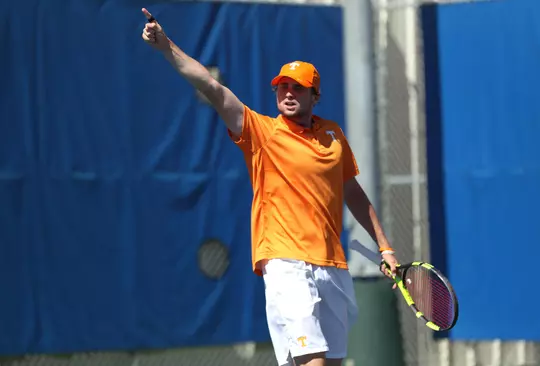
As a sophomore, Rogers did what he set out to do. He slowly worked himself into the lineup and became a massive piece as the Vols advanced to the SEC Tournament championship match—where he was the lone Vol to secure a point—for the first time since 2013, before moving on to the Round of 16 at the NCAA Championships for the first time since 2014.
While he was balling on court, UT’s homegrown talent was continuing his growth off court through Tennessee’s experiential learning program, the VOLeaders Academy.
“A lot of my success and the (mindset) shift that occurred had to do with VOLeaders and getting friends and family outside of tennis in these other sports and getting multiple different perspectives,” Rogers said. “It also allowed me to recognize that I can make an impact regardless of whether I’m a freshman, sophomore, junior or senior. Compared to the status quo of ‘you have to be a senior in order to make an actual impact.’
“Knowing that made me think about the kind of impact I wanted to have not only on myself, but also for my teammates at the end of the year.”
As he learned, grew and made himself more and more comfortable with being uncomfortable, his year in VOLeaders culminated with a trip to a country he had never seen or experienced before in his life—the African nation of Rwanda.
“That trip was special in every way,” Rogers recalled. “You come into college as a student-athlete and you only know a few things. You know school, your sport and you know the social life. So, you can kind of go through life with blinders on. VOLeaders and that trip basically took those blinders down. It showed me that there’s more to life than tennis. But the main thing was being able to look at all of the things that sport allows you to do. Sport can implement social change and create all of these positive impacts on the world.”
He took that time in his life and made it his goal to bring his experience back to the teammates he immediately put himself in charge of helping lead to each of the goals they set out for themselves.
“How can I take all of this back to the team and create something so unique like that experience with the guys?” Rogers asked of himself. “That really started my junior year. The start of that year was the first time we felt like the program culture was where it needs to be, and it’s not the facilities that are attracting guys, but the culture that’s been built.”

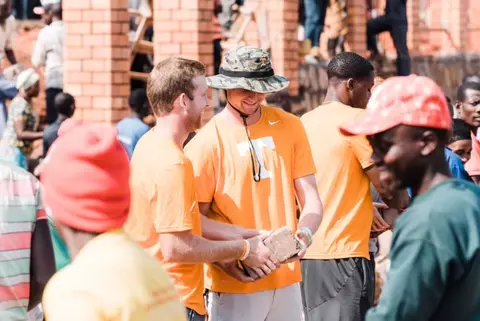
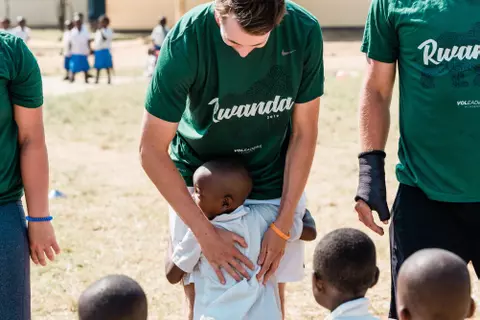
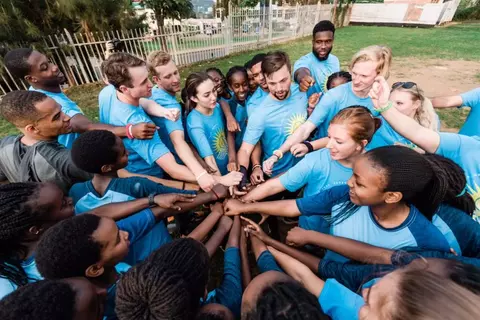
That culture got the Vols off to a blistering start to the 2020 dual season. The Orange & White were 14-2 heading into the thick of SEC play with goals beyond simply the Southeastern Conference.
Then, the COVID-19 pandemic reared its ugly head, shutting down sports across America and ending the Vols’ stellar season.
It was in those moments that Rogers and the Vols were left with a choice—run from the adversity, or take the situation for what it was and continue to push forward.
“How we approached it all as a team was taking it head-on and keeping in touch and recognizing that we’re going to need a lot of patience before we can actually get going again,” Rogers said.
They embraced patience.
As the spring concluded and the summer began, the country faced further unrest--this time from the reopening of racial wounds that have impacted and injured the U.S. for centuries.
Rogers took it upon himself to lead his teammates and to guide them in becoming allies for those who are less privileged.
“COVID just brought light to everything and gave me and my teammates time, so that if we wanted to do something, now we actually had the time to participate in these things,” Rogers said. “I remember we got on a team Zoom and we talked about wanting to do something (to promote social justice), and I was also encouraging the guys to not be quiet about this stuff.
“I said, ‘If you agree with or comply with everything happening, then you need to figure out what that says about you and your character.’ So, I was just encouraging the guys to be active in small ways.
“I’ve always been an advocate for change, and something like this that is so deeply rooted in American history just shows that it’s time for a change. It’s ridiculous that its 2021 now and everyone doesn’t really have equal rights—that needs to happen.”
Rogers used his voice. He continued to educate himself. He furthered his growth.
Stronger, together.#marchonmycampus2020 pic.twitter.com/ZNlg9phuW5
— Tennessee Tennis (@Vol_Tennis) August 29, 2020
When the team returned to Knoxville to begin preparation for a 2020-21 season that was sure to look different—along with a chance to earn back what they felt they had lost the year before—the return to practice was anything but smooth for Rogers.
He dealt with the struggles of feeling like he had to be perfect in every way and make what would be his final season in Knoxville perfect.
“Deep down, I am a massive perfectionist,” Rogers admitted. “I want to handle things and want them to be done a certain way, and life doesn’t happen like that. So, a lot of my struggles had to do with COVID. I don’t think I had really let go of that last year and the expectations I had for myself. It felt like we were trending in the right direction as a team. I felt like I was trending in the right direction. I was playing higher in the lineup and was playing No. 1 doubles and had gained a lot of responsibility. When I came back, it was a fresh start, and I did not deal with that in the healthiest way. I’ve learned that lesson twice now.”
When the dual season began Rogers was largely left out of the lineup, needing to fight for his place to contribute on a team he had helped build.
“Going into this season, how I dealt with not playing and this being my last year wasn’t healthy for me, and it wasn’t healthy for the team,” Rogers said. “It was extremely selfish. And once I realized that what I had been doing was self-sabotaging and hurting the team, the coaching staff, and causing a distraction, it made me realize that I had to get back to being my best self.
“I say that because I am a senior. I am a leader. And I was not modeling the correct way of how to deal with these things. So, I had to figure out how to forgive myself, apologize and then ultimately figure out how I was going to handle it.”
Rogers was forced to learn what his impact could and should be despite not being a focal point in the lineup match-in and match-out.
“I had to recognize that I can still make an impact on this team whether I’m playing or not. I can bring the right energy to practice. I can bring the right energy to weights, conditioning and running. I can make sure that whoever is playing is prepared. And in return, I’ll be prepared if my name does get called.”
He also had to learn to forgive himself and learn to manage the demons that had plagued him for so long.
THATS A MATCH ON SIX BOYS!!!
— Tennessee Tennis (@Vol_Tennis) February 14, 2021
Rogey blistered this serve past Evin McDonald to earn his first dual win of the season????
2-0 to the good!!!!#GBO???? pic.twitter.com/JH9PMw2UG0
We have a ton to cover on this lovely match day today folks.
— Tennessee Tennis (@Vol_Tennis) February 17, 2021
While you butter up your toast this morning, take a peek at this masterful backhand down the line Rogey fired home on Sunday????
His number was called.
He delivered.#GBO???? pic.twitter.com/GvwOvo5mOc
“I’m not perfect,” Rogers said. “I’ve made a lot of mistakes over my four years here. But ultimately, the biggest three things that I’ve learned is that you don’t have to be perfect, but you do have to be resilient, open-hearted and willing to ask for help. A major reason I was able to conquer this inner-perfection demon was because I had good people around me, calling me out and willing to have hard conversations with me, along with a coaching staff and team that knew I wasn’t at my best. Those guys also were not judging me at my worst. It was more so that they were there for me, and they pushed me to get it under control so we could accomplish all of the things we set out to do.”
As his journey as a Tennessee Volunteer neared its conclusion, Rogers and the Vols took on the nation’s best at the NCAA Team Championship in Orlando, falling just short, in the semifinals to Baylor.
While his career didn't end with a trophy, Rogers—a Cinema Studies major—hopes to use all of the things he’s learned and grown from to further impact the world through movies he hopes to one day create for the big screen.
“Talk about a great way to spark something,” Rogers said. “A movie or a book. It’s definitely something I’ve thought about, and movies are incredible platforms to get a message out and inspire people and to make them feel something. I really hope one day to write a movie that will spark something in one person and maybe even a million. It’s changing the minds or encouraging someone to change their mind on a topic and getting them to do something and hopefully to act on it one day.”
While he will be moving on to the next stage of his life; his growth and his drive to continue to learn and improve with each passing experience will never cease, no matter how far he may stray from the place that truly became Rogers’ home sweet home.
“My personal story over my four years is not perfect,” Rogers concluded. “It is not walk-on to All-American, or record-setter, or record-breaker… but it is walk-on to SEC Champion. It is one of humility, hard-work, perseverance, hard conversations and change. It is one of falling seven times and rising up eight.
“I’ll add… this season hasn’t been perfect. We’ve taken losses. But what this team prides itself on is getting back up, sticking together and getting back to work. I could not be more proud to have been a part of this team’s journey for the past four years.”
